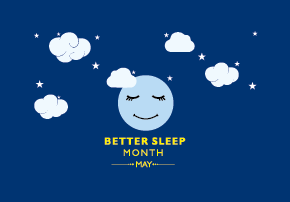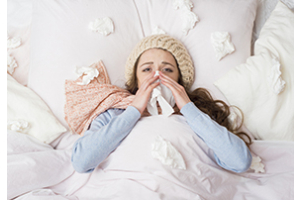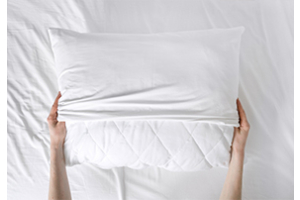Sleep better, live better.


Sleep better, live better.
7 reasons scientists want you to sleep better.
It feels like everyone is talking about sleep, and with good reason. For years we have known that eating well and exercising regularly are key to living a long, healthy life. Sleep was just something we did (or didn’t do depending on who you speak to). But now, more and more research is emerging to show that a healthy life starts with healthy sleep. But why? Loads of successful people seem to sleep less than 6h a night and manage – why shouldn’t you do the same? Well, it may be tempting to steal a couple of hours from sleep to accomplish more (and you may even feel that you have “adjusted” to less sleep) but here are ten reasons to make you think twice before burning the midnight oil:
- Did you know that individuals sleeping less than 6h per night are 66% more likely to have hypertension than those sleeping between 7 and 8h? Ongoing sleep deficiency has repeatedly been linked to an increased risk of heart disease, hypertension and stroke. This may be because sleep is a time during which our blood pressure usually drops, allowing our cardiovascular system time to rest and repair. Prolonged short sleep hampers this drop in blood pressure, putting an extended strain on your heart and blood vessels and increasing inflammation in the body.
- Short sleep is also associated with impaired glucose control (slower glucose metabolism and increased insulin resistance), increasing an individual’s risk of developing type 2 diabetes mellitus.
- Sleep has a housekeeping function for our brain. During sleep, the toxins which may have built-up as by-products of metabolism are “cleaned” from the brain via our glymphatic system. New research shows that the brain actually decreases in volume slightly to allow for the glymphatic system’s fluids to enter the brain and remove toxins.
- If you want to avoid falling victim to flu season this year, sleep might be your best defence. Without enough sleep, your immune system takes a knock - leaving you vulnerable to every virus or bacteria crossing your path. Sleep helps with both your innate immunity (broad, generalised and immediate protection) and your adaptive immunity (more specifically, learned immunity which we will discuss in the next point). This may be because sleep is a time of less muscle activity, leaving more energy available for the immune system to perform these critical tasks.
- While our immune system is active day and night to guard against the various pathogens we encounter, it’s during sleep that our immune system activity really ramps up. Here, the immune system can shift gears to focus more on adaptive immunity. It removes damaged and mutated cells and thus, sleep has a critical anti-cancer role. It also makes antibodies to the viruses and germs to which you were exposed to during the day. In this way, sleep also improves your immune memory and vaccine response so that you are more effective at responding to antigens that you have previously been exposed to.
- But it's not just our immune memory that is better with sleep, it's our normal memory too. When we sleep, the neural pathways that were necessary for retaining information and learning new skills during the daytime are reinforced. In fact, research shows that if you really want to remember what you have learnt, the night before your exam may be the time to hit the hay rather than hit the books. In one study, students who were allowed to sleep after learning remembered more than those who remained awake instead.
- There’s a reason people say they woke up on the wrong side of the bed. When we don’t sleep enough we tend to be more moody, irritable, stressed and emotional. Overall, just more likely to lose our cool over minor inconveniences. Insufficient sleep can also worsen symptoms of depression and anxiety as well as increase the risk of developing these disorders.
With all that being said, there is a huge variation in people's resilience to shortened sleep. Some people also just need less sleep than others. But, if you had a pill that offered you better physical, mental and emotional health as well as more energy to tackle the day, wouldn’t you take it? Sleep is that pill. Good quality sleep that meets your personal sleep need has a myriad of benefits associated with it – some of which you may not even have realised. There is overwhelming evidence to suggest that sleeping better may be the key to living better. So why not make May, the “Better Sleep Month”, the month you prioritise your sleep and improve your life one night at a time?
If you want to sleep better but don’t know where to start or feel like nothing is working, Sleep Science can help. Our team of sleep consultants can offer evidence-based guidance to point you in the right direction. We can also help companies make it a “Better Sleep Month” for your employees with talks, workshops or sleep health screening. Find out more at www.sleepscience.co.za and explore the benefits of extensive sleep research, put into practice.
If you feel it’s your bed that is causing your sleep problems, then the easiest way to sleep better is to find the right mattress. Come into your nearest Dial•a•Bed and take a simple Sleep Station test. We’ll have you sleeping on your ideal dream machine in hardly any time at all. No hassle, no bother, no worries. And if, even after delivery, you’re not happy with your choice, you have a 100-Night Comfort Exchange period to swap it for another mattress.* Now that’s taking the stress out of investing in your best sleep. #SleepForLife.
TAKE CARE: Lifestyle recommendation is not medical advice. Always consult your healthcare professional should you be experiencing prolonged sleep difficulties or related health issues. *Ts & C’s apply.





